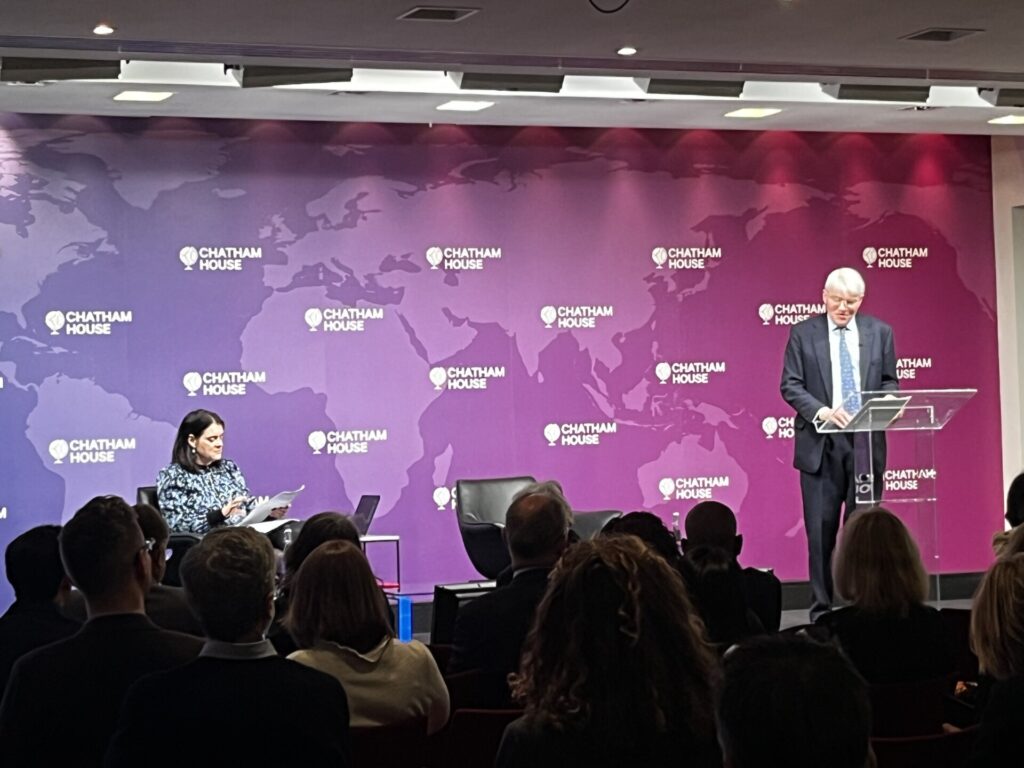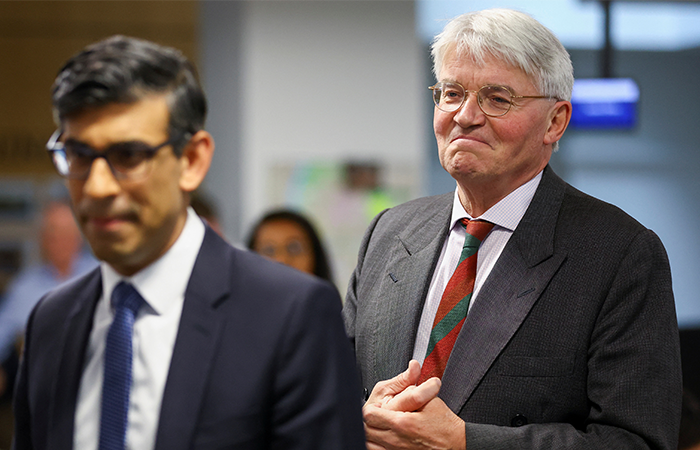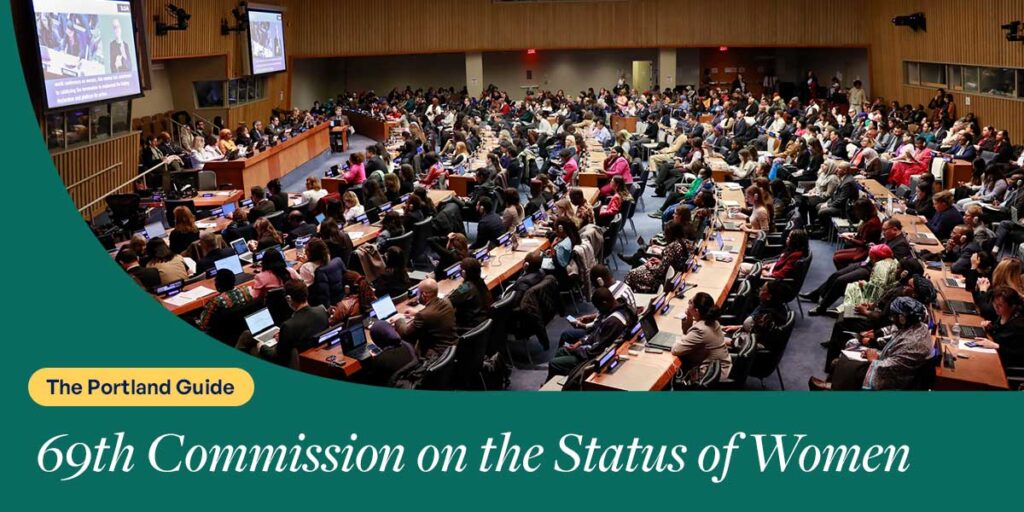There’s never a dull moment when it comes to our charismatic International Development Minister, Rt Hon Mr Andrew Mitchell MP, who laid out a bold new vision for the future of British overseas aid in a powerful speech at Chatham House yesterday.
One of his key messages was the renaming of UKAid to UK International Development, with a new logo underscored with the inscription “Partnership. Progress. Prosperity”. The rebrand aims to demonstrate a new strategy for UK development designed to be “broader than aid”, going beyond the sticking plaster imagery that aid evokes.
The Minister spoke with huge passion about his personal mission to bolster British public support for development in the UK. He wants to turn the current 50/50 support to 70/30 support in the next decade.
Portland’s own research showed that a surprising number of target voters support international aid, but not for the reason you might think.
Our poll of just under 8,000 people showed 72% of the public support international aid, including 70% of those living in the ‘Red Wall’ and 80% of those in the ‘Blue Wall’.
However, campaigns and campaigners focus on the moral drivers, target voters are compelled by self- and national-interest. So is this where the Minister should focus the language of his new mission?
Our research suggests so, with those surveyed saying that Covid-19 and Putin woke the public
up to this country’s vulnerability to threats abroad, and the need for international aid to be invested in areas like global health, to help ‘nip problems in the bud’.
Material changes
During his Chatham House speech yesterday , the Minister laid out “an ambitious vision” that encompassed a range of topics from conflict resolution and poverty reduction to women’s rights and climate change. He emphasised that he would champion the seven priorities that Prime Minister Rishi Sunak set out in the refresh of the Integrated Review of Security, Defence, Development and Foreign Policy in March.
These priorities include improving the global financial system; making global tax systems “fairer”; delivering clean, green infrastructure and investment; improving global food security; making the case for “open science”; preventing the next global health crisis; and putting women “at the heart” of development.
Emphasising his ambition to fully integrate aid with other government priorities like defence and diplomacy, and alongside renaming UKAid, the Minister also announced:
- The Government will create a second Permanent Under-Secretary within the Foreign Office responsible for ODA
- The Government will create a cross-Whitehall committee to be co-chaired by Mitchell and John Glen, the Chief Secretary to the Treasurer
- As Development Minister, Mitchell will also sit on the National Security Council as well as in Cabinet
- He will also be Governor to the five major multilateral development banks, including the World Bank and the African Development Bank
A mixed reaction
Reactions to the Minister’s speech were mixed. Praised for being necessarily ambitious, some said it avoided addressing the ‘elephant in the room’ of how it would be paid for. Especially as the Minister said he would not “open Pandora’s box” and reopen the debate surrounding Government development spending and didn’t expand on questions around 20% of spending going towards the housing of immigrants in hotels across the UK.
This comes just months after a report by the international development committee said the Home Office was ‘raiding’ the ODA pot, which it’s Chair Sarah Champion told the Guardian was like “robbing Peter to pay Paul”.
Some top UK aid agencies are advocating for Home Office expenditure on first year costs for asylum seekers to be sought elsewhere, given it’s depleting an already reduced aid budget with real world impacts. For example, a £7m Save the Children programme for vulnerable girls and women in Afghanistan had its budgeted slashed to £1m within weeks of signing a contract with FCDO.
Katy Chakrabortty, Head of Advocacy at Oxfam, praised Government for recognising it must “prioritise long-term development”, she added in her official response that “[Government] needs to turbo-charge its efforts if it hopes to re-establish itself as a global leader and meet the scale of the challenges the world faces.”
Ian Mitchell, senior policy fellow at the Center for Global Development, called the Government’s move from “aid to ‘international development” a positive indicator of “modernisation alongside a welcome refocus” on poverty reduction that has the capacity to improve the “UK’s influence, impact and reputation”. However, he reiterated that if the Minister is unable to convince Chancellor Jeremy Hunt that “funding hosting refugees” should no longer be part of the UK’s aid budget, the Minister’s ambitious plans would merely “come alongside further cuts”.
Portland analysis
By Alice Klein, Director in Portland’s International Team
We were interested to hear the UK is lobbying strongly to make the international financial system more receptive to the needs of developing nations. In particular, the Minister talked about both debt restructuring and offering better access to capital for these nations to “drive their own development”.
In a speech filled with analogies, examples and personal stories, one witty one liner stood out in particular: “Crises are everywhere but leadership is not. We can save a bank in California in three days but Zambia waits 30 years for debt relief”.
Following the spring meetings at the IMF and World Bank, where debt restructuring was high on the agenda, it wasn’t necessarily a surprise the Minister openly praised the Bridgetown Initiative.
This is a proposal for IMF debt restructuring, spearheaded by the Barbadian Prime Minister Mia Mottley. Can we assume then the UK’s highest office will not only attend the Summit for a New Financial Pact in June, but play a pivotal part in debt restructuring alongside our French counterparts at an event hosted by President Emmanuel Macron? We will be watching with bated breath.
With supersized debt in many low- and middle-income countries that are most vulnerable to the impacts of climate change, these discussions couldn’t come soon enough. It is now increasingly hard to separate climate change from international development spending given the former not only impacts but increasingly dictates the latter, and the Minister’s speech alluded to this well.
Some aid agencies called Mr Mitchell’s announcement of £1bn being put towards climate-sensitive humanitarianism as arriving “far too late” but at least he has acknowledged the huge interplay between climate change, fragility and humanitarian need.
Saying “It is frankly obscene that in the 21st century and in our word of plenty, children are slowly starving to death”, Mr Mitchell was rightly praised for prioritising malnutrition as an urgent priority and we look forward to hearing more about both the Horn of Africa Summit slated for late May and a summit he will host in London in November to convene the international community on the crisis.
Overall, Mr Mitchell’s aims to increase public support for his new agenda is laudable. We will watch keenly to see how the Government will work with partners and civil society to achieve it.
If you are a foundation, philanthropist or international development organisation with an interest in this debate, please do contact us to discuss your needs and any support Portland may be able to offer.






